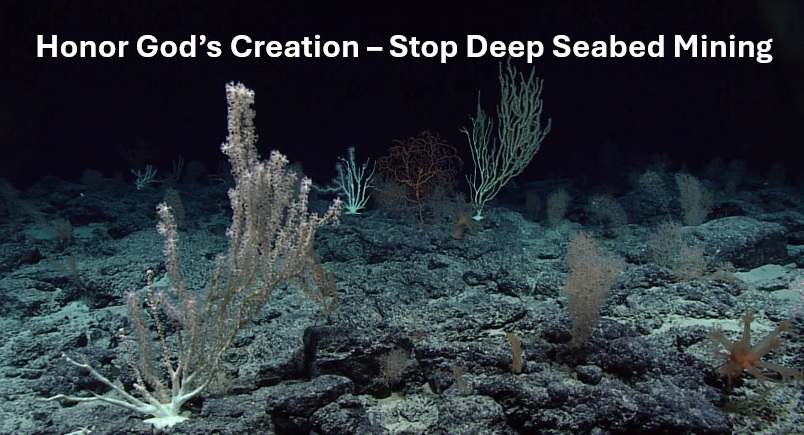Faith Organizations Speak Out Against Deep Sea Mining
Twenty-six faith organizations tell Congress to oppose the Trump administration’s executive order to fast track deep sea mining in the open ocean outside of U.S. territorial waters, destroying habitats that have taken millions of years to form, and endangering marine life and coastal communities.
October 30, 2025
We, the undersigned U.S. faith organizations, urge you to express strong opposition to the Executive Order “Unleashing America’s Offshore Critical Minerals and Resources,” issued by the Trump Administration in April as well as H.R. 4018, introduced by Reps. Mike Ezell (R-Miss.) and Mariannette Miller-Meeks (R-Iowa), which would codify this dangerous order into law.. As people of faith committed to protecting all of God’s creation, we fear that this order poses an unprecedented threat to the health of the sea floor, our planet’s most vital and least understood ecosystem.
We also are concerned that the order bypasses the United Nations’ International Seabed Authority (ISA), the body overseeing mining in international waters under the United Nations Convention on the Law of the Sea (UNCLOS). While the U.S. isn’t a party to this Convention, we support our nation participating in careful international deliberations around what has been called the “common heritage of humanity.”
The deep sea, defined as ocean areas below 200 meters, covers two-thirds of the seafloor and constitutes over 95% of Earth’s biosphere. Far from being a barren wasteland, the deep sea is a realm teeming with unique and often undiscovered biodiversity, adapted to extreme conditions over millions of years. Scientists continue to uncover new species with every exploration, highlighting how little we truly understand about these intricate ecosystems. Seabed resources are considered the “common heritage of humanity” under UNCLOS and overseen by ISA to ensure equitable benefit-sharing.
Deep seabed mining operations, which involve massive machines digging, dredging, and vacuuming the ocean floor, would unleash a cascade of devastating impacts including irreversible habitat destruction and biodiversity loss. The physical removal of polymetallic nodules and other mineral deposits could obliterate habitats that have taken millions of years to form and support unique life forms. Studies have shown that areas disturbed by mining trials decades ago still show significant biodiversity reduction and lack of recovery.
The deep ocean plays a critical role in regulating Earth’s climate by storing immense amounts of carbon in seabed sediments. Disturbing these sediments would release stored carbon, impairing the ocean’s capacity to mitigate climate change and potentially exacerbating global warming. Mining activities would generate vast sediment plumes, spreading disturbed particles, heavy metals, and toxins over hundreds of kilometers. These plumes could smother marine life, disrupt feeding and reproductive cycles, and introduce harmful substances into the marine food web, with unknown long-term consequences. The damage to deep-sea habitats and the introduction of pollutants could have cascading effects on fish populations, threatening global fisheries and the livelihoods of coastal communities dependent on marine resources.
Just days after the EO was issued The Metals Company U.S. arm submitted a permit application. Given the profound scientific uncertainty surrounding the deep sea’s ecosystems and the potentially catastrophic and irreversible nature of deep seabed mining, a precautionary approach is not just advisable, but imperative. For this reason, 32 countries and numerous civil society organizations are urging a global moratorium on deep seabed mining to allow for comprehensive scientific research, robust environmental impact assessments, and the development of a strong, precautionary regulatory framework. This includes a call to pursue alternative solutions such as advanced recycling technologies, sustainable material design, and improved terrestrial mining practices.
The deep sea is a frontier of life, a vital component of our planet’s climate system, and a source of immense scientific discovery. As people of faith we are devoted to being good stewards of our common home and cannot stand by while our sacred deep seas face the risk of irreparable damage. We urge you to voice opposition to the Executive Order “Unleashing America’s Offshore Critical Minerals and Resources” which prioritizes profit over stewardship, threatens God’s creation and removes safeguards to our sacred oceans for future generations. We also call on Congress to reject H.R. 4018 and any other efforts to fast-track deep seabed mining at the expense of God’s creation. Instead, we urge you to support a global moratorium and ensure a precautionary, science-based approach before allowing any such development to move forward.
Signatories:
Alliance of Baptists
American Friends Service Committee
Catholic Climate Covenant
Church of the Brethren, Office of Peacebuilding and Policy
Creation Justice Ministries
Dominican Sisters of Hope
Franciscan Action Network
Franciscan Peace Center, Clinton, Iowa
Franciscan Sisters of Little Falls, MN
Maryknoll Office for Global Concerns
Maryknoll Fathers and Brothers
Maryknoll Sisters of St. Dominic, Inc.
Medical Mission Sisters, Justice Office
Mennonite Central Committee U.S.
Michigan Interfaith Power & Light
New Mexico & El Paso Interfaith Power & Light
Religious sisters of the Sacred Heart of Mary, Eastern American Area
Religious Sisters of the Sacred Heart of Mary, Western American Area
Sisters of Charity of Cincinnati
Sisters of Charity Federation
Sisters of Mercy of the Americas Justice Team
Sisters of Saint Francis, Rochester, MN
United Church of Christ
World Christian Life Community
Temple of Understanding
Waterspirit

